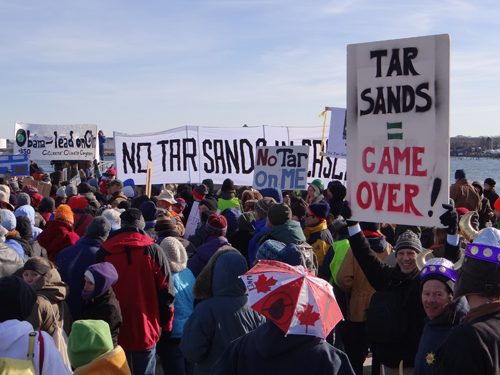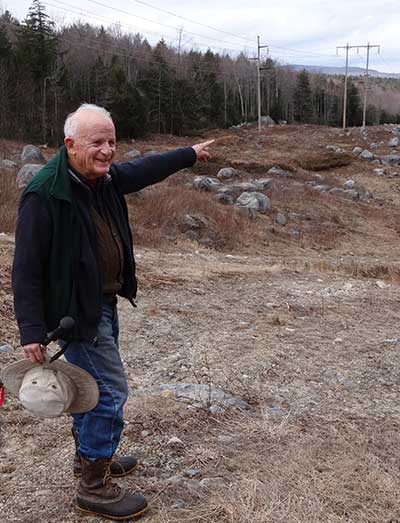
Tar sands rally on Maine State Pier, January 26, 2013
Tar sands oil is the dirtiest and most climate-destructive form of oil in the world. Extracted from huge open-pit mines in Alberta, Canada, tar sands oil is 20% more carbon intensive than conventional crude oil. When it spills, it is almost impossible to clean up. The sprawling tar sands operations in Alberta are one of the most environmentally destructive energy projects in the world, destroying boreal forests that provide crucial habitat for endangered woodland caribou and serve as breeding grounds for millions of birds. The boreal forest stores 11% of the world’s carbon and is our first line of defense against climate change.
The Natural Resources Council of Maine was the first organization to bring the threat of tar sands to the public’s attention when, in 2009, big oil companies proposed to reverse the existing 63-year-old Portland-Montreal pipeline to bring tar sands oil through Maine to be exported by tanker. This antiquated pipeline crosses some of our state’s most pristine watersheds and ends at Casco Bay. The tar sands plan would have put our lakes, rivers, coastal waters, and fishing and lobster industries at risk. It would have threatened the drinking water of communities that rely on Sebago Lake for their supply (more than 15% of all Mainers).
After careful research and analysis, in 2012, NRCM began working with citizens from South Portland to protect their community from threats posed by tar sands infrastructure. As part of this effort, seven Maine communities—Bridgton, Casco, Harrison, Otisfield, Portland, Raymond, and Waterford—passed resolutions in opposition to transporting tar sands oil through their communities via the pipeline.
On January 26, 2013, Portland, Maine, was the sight of the largest tar sands protest in the Northeast, with hundreds of people from across Maine, New England, and Canada carrying signs and marching through the city to rally at the Maine State Pier. The rally and march were held to oppose the proposal to send dirty tar sands oil through the 236-mile-long pipeline to a new tanker loading facility in South Portland.

NRCM's Judy Berk, Lisa Pohlmann, Emmie Theberge, and Dylan Voorhees give the "thumbs up" after the South Portland vote.
In 2013, the residents of South Portland nearly passed a Waterfront Protection Ordinance by referendum to protect the city from the tar sands project, which would have included new smokestacks emitting toxic chemicals near Bug Light Park. But oil industry interests, mostly from outside Maine, spent more than $600,000 to defeat the ordinance (outspending proponents 6:1). The narrow loss for the Waterfront Protection Ordinance made it was clear that residents didn’t want tar sands in the city. The day after the election, the South Portland City Council began to put in place a six-month moratorium on any crude oil export facility, protecting the city from tar sands until early May 2014. A three-member committee was appointed by the City Council, and they drafted an ordinance to permanently prevent a tar sands loading terminal.

For Lee Margolin, owner Pennesseewassee Brewing Company and Acme Lamprey Company in Harrison, the risk is too great. “The river, the lake—I’m in heaven here. A spill would be catastrophic. There’s just not enough benefit for anyone around here. The benefit is out there somewhere, in the company’s pocketbook, and we bear all the risk. Nope. Sorry, but no. I’m not going to go for it. I can’t get behind it.”

Bart Hague, Waterford resident and retired water quality planner at EPA saidin 2013, “My concern is the critical nature of the resource. That’s my biggest worry, that we’ve got this really great resource for wildlife and water.” And unless the pipeline company has a monitoring system, it could be some time before anyone noticed a spill. “It’d have to be somebody crossing the road and walking down there,” to notice, Bart says.











